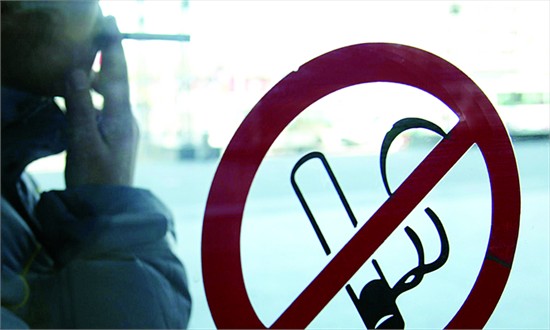
A man smokes near a no-smoking sign at Beijing Junefield Department Stores, Xicheng district.
Anti-smoking experts have welcomed a raft of new anti-smoking proposals from the government, including increasing fines for those who smoke in prohibited areas.
It comes after the failure of last year's smoking ban in the capital, which started May 1, mainly due to lax enforcement, and an unwillingness by some establishments to enforce it.
A draft regulation from legal experts has been made public for citizens' opinions from March 27 to April 30 by the Standing Committee of the Beijing Municipal People's Congress, according to the committee's website.
The draft stipulates that smoking will be completely banned in indoor public places, offices and on public transportation. There will be heavier fines of 50 to 200 yuan ($7.9-31.7) for violators, and institutions or businesses which do not enforce the ban will be fined 5,000 to 10,000 yuan.
The report also proposes that tobacco sales be halted on May 31, World No Tobacco Day, each year.
Ying Songnian, a professor at China University of Political Science and Law, and also the lead draft writer, told the Beijing News that the key to anti-smoking lawmaking is to coordinate the relationship between smokers' freedom and nonsmokers' health. Smokers claiming their rights will be restricted are the biggest obstacle to anti-smoking regulations, he said.
"This draft's contents show much progress compared to previous ones," said Yang Gonghuan, head of China Tobacco Control Office affiliated to the Chinese Center for Disease Control and Prevention.
In May last year, an attempt was made to ban smoking in indoor places, including restaurants and bars, but as there was no enforcement, the measure had little effect.
Yang said restaurants should be singled out, as it is difficult to enforce nonsmoking, as some owners believe it will negatively affect business.
Sui Wendai, 30, who works in public relations, said he started smoking aged 16, and would smoke three packs every two days. But since smoking was banned in his office, his habit has gone down to one pack every three days.
"I used to go to a restaurant regularly because smoking was allowed, but now I don't any more after smoking was banned," said Sui, adding that he would avoid going out to eat if smoking is banned in all Beijing's restaurants.
"People's sense of tobacco control is becoming stronger in recent years," said Rao Yingsheng, deputy director with Beijing Patriotic Health Campaign Committee.
His committee can fine organizations which flout the ban after the first warning, usually between 1,000 to 5,000 yuan. However, the committee only has 1,200 part-time supervisors to cover 10,000 organizations all over Beijing each month, Rao said.
"We have anti-smoking rules, but they are seldom practiced rigidly," said Zhou Zijun, professor with the school of public health, Peking University. Enforcement is the key, he said, as most smokers do not realize it is immoral to threaten others' health.
A survey by Gallup Consulting shows that China has 320 million smokers, accounting for one third of the world's smokers, and 740 million people are exposed to second-hand smoke, reported China Newsweek in early March.
Yang believes that while Beijing will set an example for the rest of the nation, there should be a stricter approach to controlling tobacco companies, as while smoking is declining in some countries, it is on the rise in China.
"As to China's bad performance in tobacco control, as measured by the WHO Framework Convention on Tobacco Control, it's beyond any local government's ability to change it," she noted.

Copyright ©1999-2011 Chinanews.com. All rights reserved.
Reproduction in whole or in part without permission is prohibited.